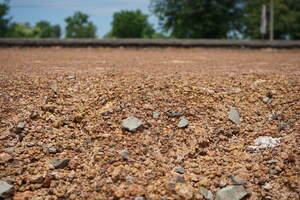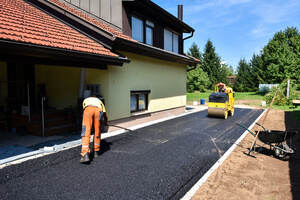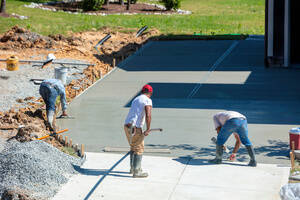Installing a new driveway is a significant investment and a decision that can impact your property’s aesthetics and functionality. One of the key choices you’ll face is whether to go with an asphalt or concrete driveway. In this blog, we’ll delve into essential tips for a successful asphalt or concrete driveway installation and guide you through the process.
Assessing Your Needs and Budget

When embarking on the journey to install a new driveway, the first and most critical step is to assess your unique needs and budget. It’s crucial to have a clear understanding of your financial constraints before proceeding. Both asphalt and concrete driveways come with their own costs.
Asphalt Driveways
Asphalt is often seen as a more budget-friendly option when compared to concrete, particularly in the short term. Its initial installation cost is typically lower, making it an attractive choice for homeowners looking to save on upfront expenses.
However, it’s important to note that while asphalt offers affordability initially, it may require more frequent maintenance and repairs over its lifespan. The need for periodic sealcoating and repairs can add to the long-term costs. It’s essential to factor in these maintenance expenses when evaluating your budget.
Concrete Driveways
Concrete driveways, on the other hand, tend to have a higher upfront cost compared to asphalt. However, this initial investment is often offset by their long-term durability and lower maintenance needs. Concrete is known for its strength and resilience, making it less susceptible to cracking, potholes, and wear and tear.
This longevity can result in cost savings over time as you won’t need to invest as much in maintenance and repairs. Additionally, concrete driveways can offer a wide range of design options, adding to their aesthetic appeal and potentially increasing your property’s value.
Choosing Between Asphalt and Concrete
Choosing the right material for your driveway is a pivotal decision that significantly impacts the outcome of your project. Both asphalt and concrete driveways come with their own distinct advantages and disadvantages, and it’s essential to delve into these characteristics while considering factors like climate, maintenance, and durability.
Asphalt Driveways
Asphalt driveways are often favored for their cost-effectiveness during the initial installation phase. They offer flexibility, which means they can handle slight ground movements without cracking.
Additionally, they can be installed relatively quickly, minimizing disruption during construction. However, they do demand regular maintenance, including sealcoating and repairs, to prevent issues like cracks and potholes. While durable, asphalt may wear faster, especially under heavy loads, potentially requiring resurfacing or replacement sooner than concrete.
Concrete Driveways
On the other hand, concrete driveways are known for their exceptional durability, making them a top choice for driveways with heavy traffic or larger vehicles. They typically require less maintenance than asphalt, lasting for decades with minimal upkeep. The aesthetic versatility of concrete is another notable advantage, offering various design options to create a customized and visually appealing driveway.
Concrete driveways come with a higher initial cost, which can be offset by their long-term durability and reduced maintenance. In regions with extreme temperature fluctuations, there’s a susceptibility to cracking due to freeze-thaw cycles, but proper installation and sealing can mitigate this risk.
Preparing the Site

The preparation of your site is the foundational stage of your driveway installation project, and its importance cannot be over
stated. Proper site preparation ensures that your driveway not only looks good but also functions effectively and lasts for years to come. Here’s an in-depth exploration of why site preparation is so vital:
Clearing Obstacles and Debris
Before any construction begins, it’s imperative to clear the area of obstacles and debris. This includes removing rocks, roots, tree stumps, old pavement, and any other materials that might impede the installation process. Clearing the site creates a smooth, even surface that is essential for ensuring the structural integrity of your driveway. Neglecting this step can lead to uneven surfaces, which can result in drainage problems, cracks, and overall instability. Proper site clearing also paves the way for efficient excavation and grading, setting the stage for a well-designed and functional driveway.
Excavation and Addressing Drainage Issues
Excavation is a crucial aspect of site preparation, as it serves multiple purposes. First and foremost, it allows for the removal of any unsuitable soil layers and the establishment of a stable sub-base. This sub-base is fundamental for ensuring proper load distribution and preventing the formation of cracks and potholes in the future. Additionally, excavation can address drainage issues. Proper grading during excavation ensures that water flows away from your driveway, preventing water from pooling or causing erosion. Inadequa
te drainage can lead to water damage and shorten the lifespan of your driveway. Therefore, getting the excavation right is paramount in preventing potential issues down the road.
Obtaining Necessary Permits
Depending on your local regulations and the scope of your project, you may need to obtain permits before construction begins. These permits are vital to ensure that your driveway installation complies with zoning and environmental requirements. Failure to obtain the necessary permits can result in costly delays and legal complications. Consulting with your local authorities or a professional contractor can help you navigate the permitting process and ensure that your project remains on the right side of the law.
Design and Layout
The design and layout of your driveway can greatly influence its visual appeal and functionality. Explore design options, including borders, patterns, and decorative elements, and discuss factors like driveway width and slope that impact functionality. Concrete and asphalt offer different design possibilities:
Concrete
Concrete driveways provide ample design flexibility. They allow for various finishes, patterns, and colors, making them an ideal choice if you desire a customized and visually captivating driveway. From stamped patterns that mimic the look of stone or brick to staining techniques that imbue the surface with unique hues, concrete offers an array of options to express your creativity.
Asphalt
While asphalt might not be as versatile as concrete in terms of design, it can still create a clean, classic appearance. The dark color of asphalt complements many architectural styles and surroundings, providing an understated elegance that emphasizes simplicity and functionality.
Base Preparation
At the heart of a durable driveway lies a solid foundation, and this base preparation serves as the bedrock of your project. Understanding the significance of a well-compacted sub-base is essential, and the use of geotextiles or fabric in specific scenarios can further enhance stability.
Well-Compacted Sub-Base
To ensure the longevity and structural integrity of your driveway, a well-compacted sub-base is indispensable. It provides a stable platform that distributes the load evenly, preventing issues such as settling, cracking, and uneven surfaces. Proper compaction minimizes the risk of structural failure over time, making it a foundational aspect of your project’s success.
Geotextiles or Fabric
In some situations, the use of geotextiles or fabric can be advantageous to enhance stability. These materials are often employed to improve soil separation, filtration, and reinforcement. Geotextiles can prevent the mixing of base materials with the subsoil, reducing the likelihood of settlement and ensuring that your driveway retains its integrity even under challenging conditions.
Installation Process: Asphalt
For those opting for an asphalt driveway, the installation process involves several crucial steps:
Proper Grading for Water Drainage
The correct grading of the driveway is essential to facilitate efficient water drainage. A well-graded surface ensures that water flows away from the driveway, preventing ponding or erosion. This step is fundamental in preserving the structural integrity of your asphalt driveway and preventing water-related damage.
Applying and Compacting Asphalt
The application and compaction of asphalt are core processes. It’s crucial to apply the asphalt evenly and compact it thoroughly to create a stable, load-bearing surface. Inadequate compaction can lead to premature wear and tear, which is why this step is vital for the long-term performance of your driveway.
Smooth and Even Finish
Achieving a smooth and even finish is not just about aesthetics; it’s about functionality. A well-finished surface ensures that your driveway is safe for vehicles and pedestrians, reducing the risk of accidents and minimizing wear and tear. A smooth surface also contributes to the visual appeal of your driveway.
Installation Process: Concrete

Concrete driveways involve different techniques, and here’s a step-by-step guide:
Pouring the Concrete
The process begins with pouring the concrete, creating the foundation of your driveway. The concrete must be poured evenly and at the correct thickness to ensure strength and durability. Proper placement is essential to avoid future issues like cracking or uneven surfaces.
Finishing and Curing the Concrete
Once the concrete is in place, the finishing and curing stages are critical. Proper finishing techniques ensure that the surface is level and free from imperfections, while curing protects the concrete from drying too quickly, preventing cracks and enhancing long-term strength. Additionally, for decorative concrete, special considerations are required to achieve the desired aesthetics.
Maintenance and Sealing
Safeguarding your driveway investment necessitates ongoing maintenance, including cleaning and repairs. Furthermore, sealing options are available for both asphalt and concrete driveways to enhance their longevity. Here’s a closer look:
Regular Maintenance
Consistent upkeep is vital to the health of your driveway. This includes cleaning to remove debris and stains and conducting repairs promptly to address any issues that may arise, such as cracks or potholes. Regular maintenance ensures the continued functionality and aesthetics of your driveway.
Sealing Options
Sealants can be applied to both asphalt and concrete driveways. These protective coatings serve as barriers against environmental elements, moisture, and wear and tear. By preventing premature deterioration, sealing extends the lifespan of your driveway, reducing the need for costly repairs in the long run.
Troubleshooting Common Issues
Even with proper installation, driveway problems can surface. Common issues such as cracks, potholes, and drainage concerns are not uncommon. To effectively address these problems, it’s essential to understand their causes and employ appropriate solutions. Whether it’s crack filling, pothole patching, or drainage adjustments, tackling these issues in a timely and targeted manner is key to preserving the quality and functionality of your driveway.
Reach Out to Northern Virginia’s Driveway Installation Specialists
A well-planned and professionally executed asphalt or concrete driveway installation can enhance your property’s curb appeal and functionality. Armed with these expert tips from Dirt Connections, you’ll be better prepared to make informed decisions for your driveway project.
Remember that the choice between asphalt and concrete should align with your needs and budget, while proper planning and maintenance are key to a long-lasting, beautiful driveway. When in doubt, consult Dirt Connections today to start building your dream driveway.


